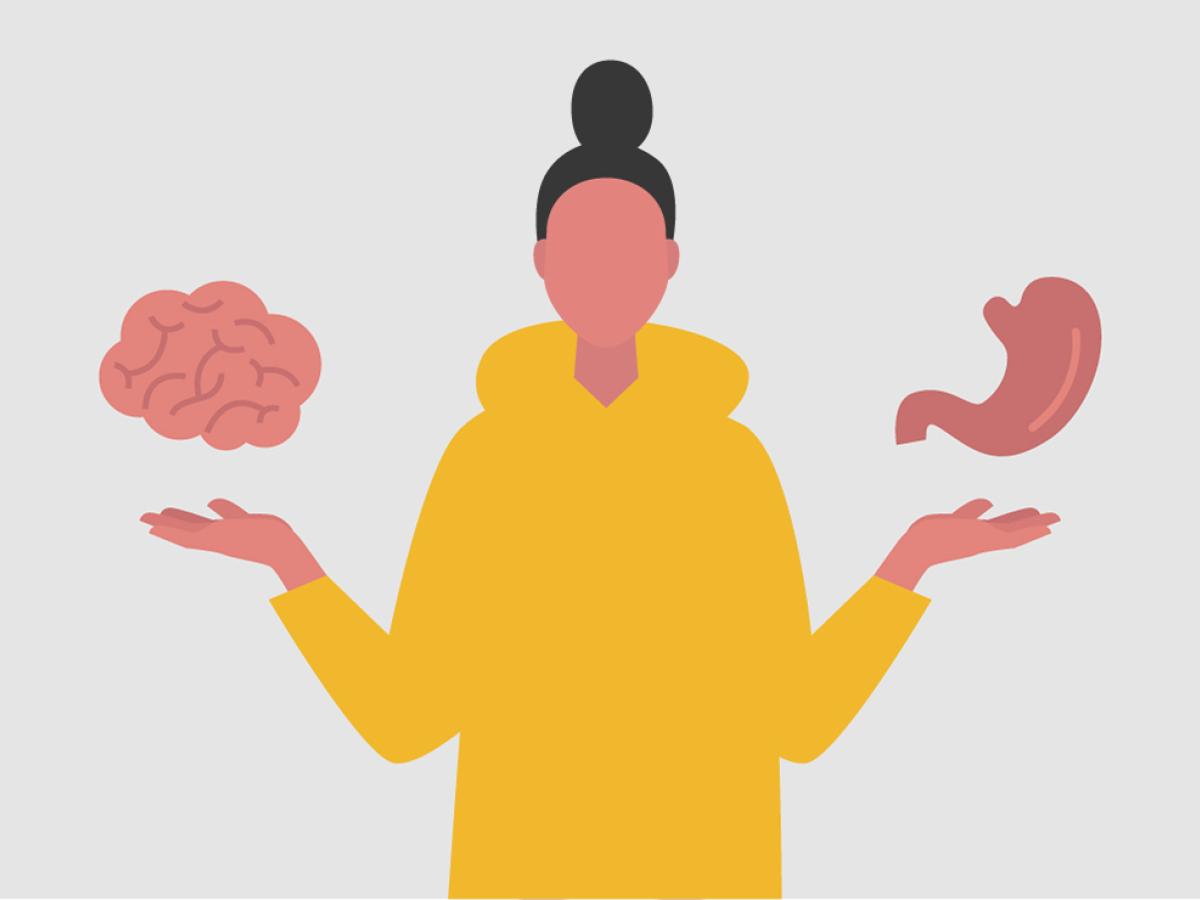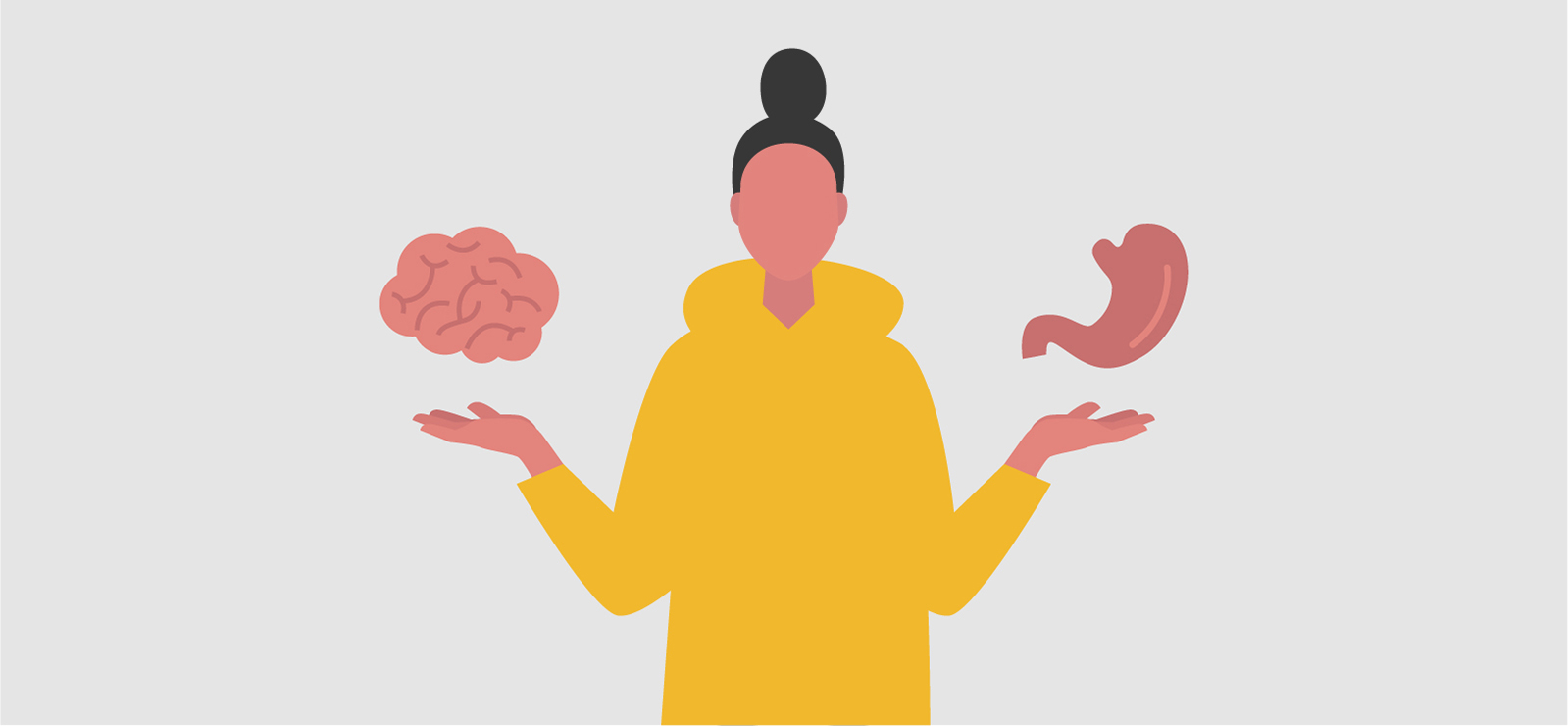March 20, 2023

Your gut and brain affect how you feel — if one or the other isn’t functioning well, you’re likely in for a rough day. But the truth is, there isn’t really a “one or the other” situation. The two work hand in hand.
It shouldn’t come as a surprise when you think about it: Butterflies before a big presentation, a crampy or nauseas stomach when you’re stressed or even losing your appetite during a super busy day.

But is there more to this connection than fleeting feelings?
To find out, we spoke with Dr. Yezaz Ghouri, an MU Health Care gastroenterologist. He confirmed that there is a link, and it’s a strong one.
“A healthy mind is a healthy body,” he says. “It’s an old saying, and it directly applies to gut health.” But he adds that it works both ways: It’s not just the mind that affects the gut; your gastrointestinal (GI) system also plays a role in your mental health.
Here’s what you need to know:
What is the link between gut health and mental health?
Below the surface, your brain and gut constantly interact and influence each other. They share many of the same neurotransmitters (chemical messengers) and communicate through a network of nerve pathways known as the gut-brain axis.
The gut-brain axis is a two-way line of communication. If either end isn’t functioning as it should, you’ll feel the effects:
How the brain influences gut health
Your mental health can impact what you eat (hello, stress eating). And what you eat shapes your gut microbiome — the bacteria and other microorganisms living in your GI system. Your gut microbiome contains both good and bad bacteria, and your diet affects the balance between the two.
But research shows that even if you don’t succumb to emotional eating, stress and depression can still alter the environment in your gut. Hormones and inflammation caused by mental health disorders can change the bacteria in your gut and how it functions.
“Mental health conditions are associated with a higher risk of developing functional bowel disorders, like irritable bowel syndrome (IBS),” Dr. Ghouri says. “But even in bowel diseases caused by inflammation, such as Crohn’s disease or ulcerative colitis, psychological stress alone can cause a patient’s disease to flare up.”
How your gut affects your mental health
If you’ve ever had diarrhea or gas, you know that GI issues don’t just affect you while you’re in the bathroom. When your digestion is off, it can affect your mental well-being by interfering with your:
- Ability to exercise due to pain or needing to be near a bathroom
- Daily lifestyle, affecting your ability to work or travel
- Diet, causing food adversities or keeping you from eating and drinking enough
- Sleep if you wake up with belly pain or need to use the bathroom throughout the night
“A lot of GI problems are associated with symptoms that irritate the body and interfere with everyday functions such as sleeping and eating,” Dr. Ghouri says. “When those vital functions get disturbed, it can affect your general health and overall mental well-being.”
But what happens in your gut affects your mental health in other ways too. Some of the same chemicals in your brain that affect your mental health also exist in your gut microbiome. Your gut bacteria produce hundreds of neurochemicals (including 95% of your body’s serotonin) used by the brain to regulate mood, memory and learning. When something alters the bacteria in your gut microbiome, it also impacts those neurochemicals — and whatever function they control.
Using the mind-gut connection to treat GI symptoms
Understanding the association between your brain and your gut can be vital in treating symptoms and avoiding flare-ups if you have a diagnosed bowel disorder.
“Many patients come to see me when their GI symptoms flare up, and they don’t realize that the symptoms could be caused by not being mentally well or going through psychological stress,” Dr. Ghouri says. “And people with inflammatory bowel disease (IBD) are twice as likely to develop mental disorders than people who do not have IBD.”
But if you are experiencing GI issues — regardless of whether you’ve been diagnosed with a bowel disorder — you should never just assume the culprit is poor mental health. The easiest solution, says Dr. Ghouri, is to see your doctor. They’ll use blood and stool tests to identify or rule out some common causes of your symptoms, such as:
- GI infection, which can be viral, bacterial or caused by parasites
- IBD, such as Crohn’s disease and ulcerative colitis
- Immune conditions or gluten sensitivity, such as celiac disease
Other possible causes, like irritable bowel syndrome, rely on a clinical diagnosis — based on signs, symptoms and medical history — often reached after ruling other conditions out. In some cases, your doctor may recommend a colonoscopy. “It’s essential to identify the cause so you can treat the symptoms appropriately,” Dr. Ghouri says. “Sometimes that means mental health treatment.”
Protecting your mental health and gut health
You can make lifestyle choices and take steps to keep your brain and your gut healthy, says Dr. Ghouri. He recommends that you:
- Don’t smoke: Besides being bad for your general health, smoking increases your risk for Crohn’s disease and colon cancer in addition to other types of cancers.
- Exercise regularly: A sedentary lifestyle does not benefit mental or gut health.
- Limit alcohol intake: Alcohol is a depressant that interferes with neurotransmitters and can increase intestinal bacteria.
- Manage stress: Limit anything that adds stress or anxiety to your life. This could include unfollowing certain social media accounts, limiting your daily to-dos or even distancing yourself from certain relationships.
- Pay attention to your diet: Your specific dietary needs may be based on any diagnosed GI issues, but for most, Dr. Ghouri recommends yogurt as a natural probiotic to support gut health.
- See a mental health specialist: Developing tools for managing stress, anxiety and depression can help you avoid GI issues related to mental health.
Next Steps and Useful Resources
- Want to read more about GI conditions and care? Learn more.
- Want to speak to a gastroenterologist? Find one today.


